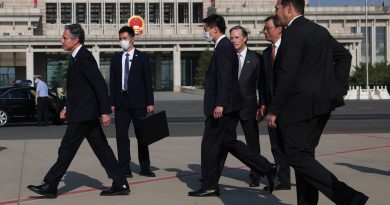K-pop prospects brighten on China market hopes as Seoul and Beijing sign content exchange deal
CHENGDU, CHINA – JANUARY 05: Lee Teuk, Ye Sung, Dong Hae and Kim Ryeo Wook of South Korean boy group Super Junior attend a press conference on January 5, 2020 in Chengdu, Sichuan Province of China. (Photo by VCG/VCG via Getty Images)
Vcg | Visual China Group | Getty Images
K-pop prospects have brightened after Seoul and Beijing signed a content exchange deal, potentially paving the way for South Korean entertainment to re-enter the Chinese market.
South Korea’s national broadcaster KBS on Saturday entered into a media exchange and cooperation business agreement with Chinese state media company China Media Group. CMG includes state media enterprises such as China Central Television, and is directly controlled by the Chinese Communist Party.
Shares of SM Entertainment rose as much as 8.11%, while JYP Entertainment gained over 9.39%. YG Entertainment and Hybe saw day-high gains of about 4% and 3%, respectively. The stocks have since pared gains.
KBS said this agreement would “promote content exchanges across the board, not only in news and sports, but also across culture, including the Chinese launch of the ‘Music Bank World Tour.'” Music Bank is KBS’ flagship program that features K-pop artists when they release new music.
KBS President Park Jang-beom said “I think it’s meaningful that we’ve created a breakthrough that will allow the entire Korean content industry to once again make a full-fledged foray into the Chinese market.”

This comes as South Korean President Lee Jae Myung and Chinese President Xi Jinping met during the Asia-Pacific Economic Cooperation, or APEC, summit, with Lee writing on Facebook that the summit was “very significant in the fact that it has fully restored the Korea-China relations.”
The return of K-pop to China could mark a turning point in the industry, after China imposed a “soft ban” on K-pop content in 2016 after South Korea deployed U.S.’ Terminal High Altitude Area Defense anti-ballistic missile system, also known as THAAD, on its soil.
KBS plans to solidify its cooperation with CMG at the APEC Summit to be held in Shenzhen, China next year, the network said.
Local media outlets have also reported that the partnership will help reviving the “Korea-China Song Festival,” an event that was held from 1999 to 2016, and saw Peng Liyuan, the wife of China’s President Xi Jinping performing at the festival in 2006, according to KBS.
While there have been small scale K-pop appearances by groups, such as fan meetings and individual member appearances, concerts or large-scale activities have not been held on mainland China, with groups making their tour stops in Macau or Hong Kong.
In what would have been the first time an all-Korean group held a concert in mainland China since 2016, boy band EPEX was to perform in Fuzhou, China, in May, but the show was “postponed due to local circumstances,” according to South Korean media.
Mainland China, Hong Kong and Taiwan combined were among K-pop’s largest markets, despite the “soft ban,” being the second largest export market for music exports from South Korea in terms of export share in 2023, according to a Korea Creative Content Agency report published in July. They accounted for 26.1% of music exports from South Korea in 2023, amounting to $319.58 million.
Japan, South Korea’s largest export market for music, had a 35.1% export share, with $429.08 million worth of music exports in 2023.
According to the 2025 Overseas Hallyu Survey published by South Korea’s Korea Foundation for International Cultural Exchange, China’s favorability rating toward South Korea stood at 73.5%, higher than the survey’s overall average.
Hallyu, or the Korean Wave, refers to the spread of South Korean content around the world. The survey also noted that interest in Hallyu content within China has not waned despite the restrictions on the direct distribution of Korean content.
“Overall, Chinese consumers’ interest in and consumption of Korean cultural content continues to grow, and there is significant potential for Korean content to exert even greater economic and cultural influence in the future,” it added.
The survey also noted that Chinese government’s recent announcement of policies aimed at attracting foreign investment and easing regulations are fueling expectations for the easing of the Hallyu ban.
In a report earlier this year, Morgan Stanley had noted that the rally in K-pop stocks was mainly due to investor expectations that China will open its market to K-pop performers.
— CNBC’s Blair Baek contributed to this report.
Source – Middle east monitor




